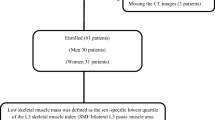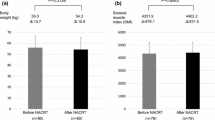Abstract
Background
This study aimed to investigate the effect of sarcopenia on the prognosis of advanced lower rectal cancer patients receiving neoadjuvant chemoradiotherapy (CRT). Sarcopenia has been recognized as an adverse factor for surgical outcomes in several malignancies. However, the impact of preoperative sarcopenia on rectal cancer patients receiving CRT is still unknown.
Methods
This retrospective study included cT3-T4 anyN M0 lower rectal cancer patients who underwent CRT followed by R0 resection at our institution between October 2003 and December 2016. CRT consisted of 5-fluorouracil-based oral chemotherapy and long course radiation (50.4 Gy/28 fr). The psoas muscle area at the third lumbar vertebra level was evaluated by computed tomography before and after CRT, and was adjusted by the square of the height to obtain the psoas muscle mass index (PMI). Sarcopenia was defined as the sex-specific lowest quartile of the PMI. We assessed the association between pre- and post-CRT sarcopenia and postoperative prognosis.
Results
Among 234 patients, 55 and 179 patients were categorized as sarcopenia and non-sarcopenia patients, respectively. Although post-CRT sarcopenia correlated with residual tumor size, it had no association with other pathological features. The median follow-up period was 72.9 months, and the 5-year DFS and OS were 67.0% and 85.8%, respectively. Multivariate analysis showed that post-CRT sarcopenia was independently associated with poor DFS (HR: 1.76; P = 0.036), OS (HR: 2.01; P = 0.049), and recurrence in the liver (HR: 3.01; P = 0.025).
Conclusions
Sarcopenia is a poor prognostic indicator in lower advanced rectal cancer patients treated with CRT.




Similar content being viewed by others
References
van Gijn W, Marijnen CA, Nagtegaal ID et al (2011) Preoperative radiotherapy combined with total mesorectal excision for resectable rectal cancer: 12-year follow-up of the multicentre, randomised controlled TME trial. Lancet Oncol 12(6):575–582
Kawai K, Kitayama J, Tsuno NH et al (2013) Thrombocytosis before pre-operative chemoradiotherapy predicts poor response and shorter local recurrence-free survival in rectal cancer. Int J Colorectal Dis 28(4):527–535
Abe S, Kawai K, Nozawa H et al (2018) LMR predicts outcome in patients after preoperative chemoradiotherapy for stage II-III rectal cancer. J Surg Res 222:122–131
Rosenberg IH (1997) Sarcopenia: origins and clinical relevance. J Nutr 127(5 Suppl):990S-991S
Fearon K, Strasser F, Anker SD et al (2011) Definition and classification of cancer cachexia: an international consensus. Lancet Oncol 12(5):489–495
Dodson S, Baracos VE, Jatoi A et al (2011) Muscle wasting in cancer cachexia: clinical implications, diagnosis, and emerging treatment strategies. Annu Rev Med 62:265–279
Reisinger KW, van Vugt JL, Tegels JJ et al (2015) Functional compromise reflected by sarcopenia, frailty, and nutritional depletion predicts adverse postoperative outcome after colorectal cancer surgery. Ann Surg 261(2):345–352
Wang SL, Zhuang CL, Huang DD et al (2016) Sarcopenia adversely impacts postoperative clinical outcomes following gastrectomy in patients with gastric cancer: a prospective study. Ann Surg Oncol 23(2):556–564
Miyamoto Y, Baba Y, Sakamoto Y et al (2015) Sarcopenia is a negative prognostic factor after curative resection of colorectal cancer. Ann Surg Oncol 22(8):2663–2668
Nozawa H, Emoto S, Murono K et al (2020) Change in skeletal muscle index and its prognostic significance in patients who underwent successful conversion therapy for initially unresectable colorectal cancer: observational study. Therap Adv Gastroenterol 13:1756284820971197
Kudou K, Saeki H, Nakashima Y et al (2017) Prognostic significance of sarcopenia in patients with esophagogastric junction cancer or upper gastric cancer. Ann Surg Oncol 24(7):1804–1810
Harimoto N, Shirabe K, Yamashita YI et al (2013) Sarcopenia as a predictor of prognosis in patients following hepatectomy for hepatocellular carcinoma. Br J Surg 100(11):1523–1530
Nakamura R, Inage Y, Tobita R et al (2018) Sarcopenia in resected NSCLC: effect on postoperative outcomes. J Thorac Oncol 13(7):895–903
Caan BJ, Cespedes Feliciano EM, Prado CM et al (2018) Association of muscle and adiposity measured by computed tomography with survival in patients with nonmetastatic breast cancer. JAMA Oncol 4(6):798–804
Trejo-Avila M, Bozada-Gutiérrez K, Valenzuela-Salazar C et al (2021) Sarcopenia predicts worse postoperative outcomes and decreased survival rates in patients with colorectal cancer: a systematic review and meta-analysis. Int J Colorectal Dis
Takeda Y, Akiyoshi T, Matsueda K et al (2018) Skeletal muscle loss is an independent negative prognostic factor in patients with advanced lower rectal cancer treated with neoadjuvant chemoradiotherapy. PLoS ONE 13(4):e0195406
Chung E, Lee HS, Cho ES et al (2020) Prognostic significance of sarcopenia and skeletal muscle mass change during preoperative chemoradiotherapy in locally advanced rectal cancer. Clin Nutr 39(3):820–828
Levolger S, van Vledder MG, Alberda WJ et al (2018) Muscle wasting and survival following pre-operative chemoradiotherapy for locally advanced rectal carcinoma. Clin Nutr 37(5):1728–1735
Park SE, Hwang IG, Choi CH et al (2018) Sarcopenia is poor prognostic factor in older patients with locally advanced rectal cancer who received preoperative or postoperative chemoradiotherapy. Medicine (Baltimore) 97(48):e13363
Amin MB, Edge SB, Greene FL et al (2017) AJCC cancer staging manual, 8th edn. Springer, New York
Rectum Jsfcotca (2019) Japanese classification of colorectal, appendiceal, and anal carcinoma: the 3rd English edition [secondary publication]. J Anus Rectum Colon 3(4):175–195
Hashiguchi Y, Muro K, Saito Y et al (2020) Japanese Society for cancer of the colon and rectum (JSCCR) guidelines 2019 for the treatment of colorectal cancer. Int J Clin Oncol 25(1):1–42
Hamaguchi Y, Kaido T, Okumura S et al (2014) Impact of quality as well as quantity of skeletal muscle on outcomes after liver transplantation. Liver Transpl 20(11):1413–1419
Taguchi S, Akamatsu N, Nakagawa T et al (2016) Sarcopenia evaluated using the skeletal muscle index is a significant prognostic factor for metastatic urothelial carcinoma. Clin Genitourin Cancer 14(3):237–243
Ozawa Y, Nakano T, Taniyama Y et al (2019) Evaluation of the impact of psoas muscle index, a parameter of sarcopenia, in patients with esophageal squamous cell carcinoma receiving neoadjuvant therapy. Esophagus 16(4):345–351
Argilés JM, Busquets S, López-Soriano FJ (2005) The pivotal role of cytokines in muscle wasting during cancer. Int J Biochem Cell Biol 37(10):2036–2046
Richards CH, Roxburgh CS, MacMillan MT et al (2012) The relationships between body composition and the systemic inflammatory response in patients with primary operable colorectal cancer. PLoS ONE 7(8):e41883
Ryan AM, Power DG, Daly L et al (2016) Cancer-associated malnutrition, cachexia and sarcopenia: the skeleton in the hospital closet 40 years later. Proc Nutr Soc 75(2):199–211
Cooper AB, Slack R, Fogelman D et al (2015) Characterization of anthropometric changes that occur during neoadjuvant therapy for potentially resectable pancreatic cancer. Ann Surg Oncol 22(7):2416–2423
Deniz Ç, Gürbilek M, Koç M (2018) Prognostic value of interferon-gamma, interleukin-6, and tumor necrosis factor-alpha in the radiation response of patients diagnosed with locally advanced non-small-cell lung cancer and glioblastoma multiforme. Turk J Med Sci 48(1):117–123
Yoneda M, Fujiwara H, Furutani A et al (2013) Prognostic impact of tumor IL-6 expression after preoperative chemoradiotherapy in patients with advanced esophageal squamous cell carcinoma. Anticancer Res 33(6):2699–2705
Makuuchi Y, Honda K, Osaka Y et al (2013) Soluble interleukin-6 receptor is a serum biomarker for the response of esophageal carcinoma to neoadjuvant chemoradiotherapy. Cancer Sci 104(8):1045–1051
Artinyan A, Orcutt ST, Anaya DA et al (2015) Infectious postoperative complications decrease long-term survival in patients undergoing curative surgery for colorectal cancer: a study of 12,075 patients. Ann Surg 261(3):497–505
Mirnezami A, Mirnezami R, Chandrakumaran K et al (2011) Increased local recurrence and reduced survival from colorectal cancer following anastomotic leak: systematic review and meta-analysis. Ann Surg 253(5):890–899
Reisinger KW, Derikx JP, van Vugt JL et al (2016) Sarcopenia is associated with an increased inflammatory response to surgery in colorectal cancer. Clin Nutr 35(4):924–927
Jochum SB, Kistner M, Wood EH et al (2019) Is sarcopenia a better predictor of complications than body mass index? Sarcopenia and surgical outcomes in patients with rectal cancer. Colorectal Dis 21(12):1372–1378
Kim SM, Yoon G, Seo AN (2019) What are the most important prognostic factors in patients with residual rectal cancer after preoperative chemoradiotherapy? Yeungnam Univ J Med 36(2):124–135
Ding P, Liska D, Tang P et al (2012) Pulmonary recurrence predominates after combined modality therapy for rectal cancer: an original retrospective study. Ann Surg 256(1):111–116
Arredondo J, Baixauli J, Beorlegui C et al (2013) Prognosis factors for recurrence in patients with locally advanced rectal cancer preoperatively treated with chemoradiotherapy and adjuvant chemotherapy. Dis Colon Rectum 56(4):416–421
Hugen N, van de Velde CJH, de Wilt JHW et al (2014) Metastatic pattern in colorectal cancer is strongly influenced by histological subtype. Ann Oncol 25(3):651–657
Bauer I, Wrosch C (2011) Making up for lost opportunities: the protective role of downward social comparisons for coping with regrets across adulthood. Pers Soc Psychol Bull 37(2):215–228
Rödel C, Graeven U, Fietkau R et al (2015) Oxaliplatin added to fluorouracil-based preoperative chemoradiotherapy and postoperative chemotherapy of locally advanced rectal cancer (the German CAO/ARO/AIO-04 study): final results of the multicentre, open-label, randomised, phase 3 trial. Lancet Oncol 16(8):979–989
Marco MR, Zhou L, Patil S et al (2018) Consolidation mFOLFOX6 chemotherapy after chemoradiotherapy improves survival in patients with locally advanced rectal cancer: final results of a multicenter phase II trial. Dis Colon Rectum 61(10):1146–1155
Acknowledgements
This research was supported by Grants-in-Aid for Scientific Research (C: grant number; 18K07194, C: grant number; 19K09114, C: grant number; 19K09115, C: grant number; 20K09051, Challenging Research (Exploratory): grant number; 20K21626) from Japan Society for the Promotion of Science. This research is supported by the Project for Cancer Research and Therapeutic Evolution (P-CREATE), grant number: JP 19cm0106502 from the Japan Agency for Medical Research and Development (AMED).
Author information
Authors and Affiliations
Contributions
SA acquired, analyzed, and interpreted the data, drafted the article, and approved the final submission. KK conceptualized and designed the study, interpreted the data, critically revised the manuscript, and approved the final submission. HN acquired and interpreted the data, critically revised the manuscript, and approved the final submission. KS, KM, SE, JK, HI, YY, YN, HA, and HS acquired the data and approved the final submission. KO analyzed and interpreted the data and approved the final submission. SI conceptualized and interpreted the data, critically revised the manuscript, and approved the final submission.
Corresponding author
Ethics declarations
Conflict of interest
The authors report no proprietary or commercial interest in any product mentioned or concept discussed in this article.
Additional information
Publisher's Note
Springer Nature remains neutral with regard to jurisdictional claims in published maps and institutional affiliations.
About this article
Cite this article
Abe, S., Kawai, K., Nozawa, H. et al. Preoperative sarcopenia is a poor prognostic factor in lower rectal cancer patients undergoing neoadjuvant chemoradiotherapy: a retrospective study. Int J Clin Oncol 27, 141–153 (2022). https://doi.org/10.1007/s10147-021-02062-z
Received:
Accepted:
Published:
Issue Date:
DOI: https://doi.org/10.1007/s10147-021-02062-z




